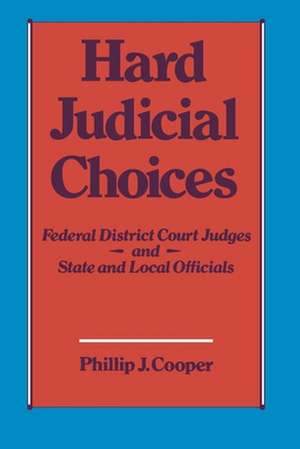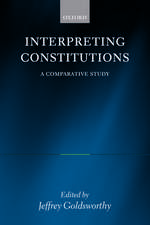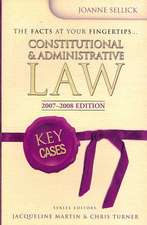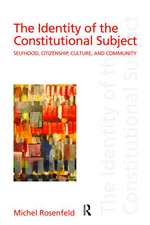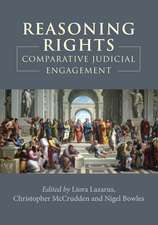Hard Judicial Choices: Federal District Court Judges and State and Local Officials
Autor Phillip J. Cooperen Limba Engleză Paperback – mar 1988
fashioned when federally protected rights are violated? How can relations between federal judges and state and local officials be improved?
This book--the first to attempt to look at such cases from the judge's point of view--examines some of these questions through five comparative case studies involving open housing in a Cleveland suburb, school desegregation in Detroit, mental health reform in Alabama, prison conditions in Ohio, and
alleged police misconduct in Philadelphia. Cooper presents a clear overview of the remedial decree process and prefaces each of the case studies with a full chapter that sets the case in its legal, administrative, and political context.
Taking a close look at the interactions between federal district court judges and state and local officials, this volume produces a model of remedial decree litigation that challenges widely held assumptions about the role of district court judges in such controversial cases.
Preț: 715.38 lei
Preț vechi: 979.97 lei
-27% Nou
Puncte Express: 1073
Preț estimativ în valută:
136.89€ • 149.16$ • 115.35£
136.89€ • 149.16$ • 115.35£
Carte tipărită la comandă
Livrare economică 23 aprilie-07 mai
Preluare comenzi: 021 569.72.76
Specificații
ISBN-13: 9780195041927
ISBN-10: 0195041925
Pagini: 384
Ilustrații: figures, tables
Dimensiuni: 156 x 234 x 20 mm
Greutate: 0.54 kg
Editura: OXFORD UNIV PR
Locul publicării:New York, United States
ISBN-10: 0195041925
Pagini: 384
Ilustrații: figures, tables
Dimensiuni: 156 x 234 x 20 mm
Greutate: 0.54 kg
Editura: OXFORD UNIV PR
Locul publicării:New York, United States
Descriere
In controversial court cases involving civil rights, schools and housing, prison reform, and other social issues, federal district-court judges are often called upon to make some of the most difficult judicial decisions. Asked to protect the constitutional rights of all individuals, even when such protection may be at odds with the interests of local majorities, federal district-court judges are frequently faced with pressure, ridicule, and even threats to themselvesor their families when deciding and implementing complex remedial decrees. Why do judges issue these decrees given the difficulties involved? How do these cases arise? How are they prosecuted and remedies fashioned when federally protected rights are violated? How can relations between federaljudges and state and local officials be improved? This book, the first to attempt to view these cases from the perspective of district-court judges, examines some of these questions through five comparative case studies involving housing discrimination, school desegregation, mental health facilities, and the right to treatment, prison conditions, and policy/community relations. An introductory chapter presents a clear overview of the remedial decree process. Each of the following case studies is preceded by a chapter that sets the case in itslegal, administrative, and political context.
Recenzii
'Phillip Cooper's book is essential reading ... It delves behind the public jurisprudence of the Supreme Court to the often sordid facts with which district judges have to cope'Richard Hodder-Williams, University of Bristol. THES'
'most important ... Philip Cooper has examined in meticulous detail ... the problems facing district court judges when dealing with social claims properly brought to their courts'Richard Hodder-Williams, University of Bristol, American Politics Review
'most important ... Philip Cooper has examined in meticulous detail ... the problems facing district court judges when dealing with social claims properly brought to their courts'Richard Hodder-Williams, University of Bristol, American Politics Review
